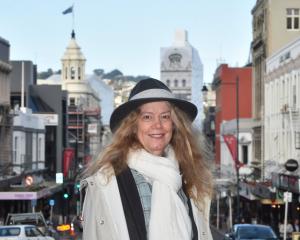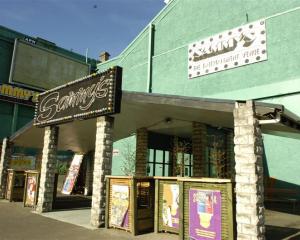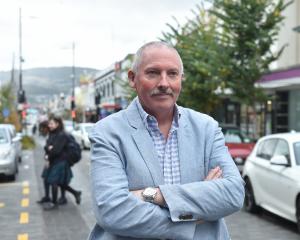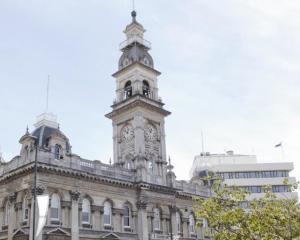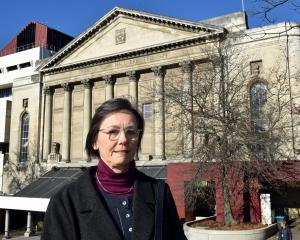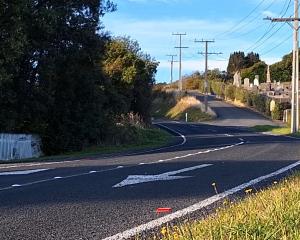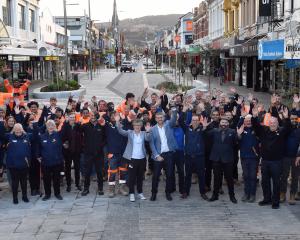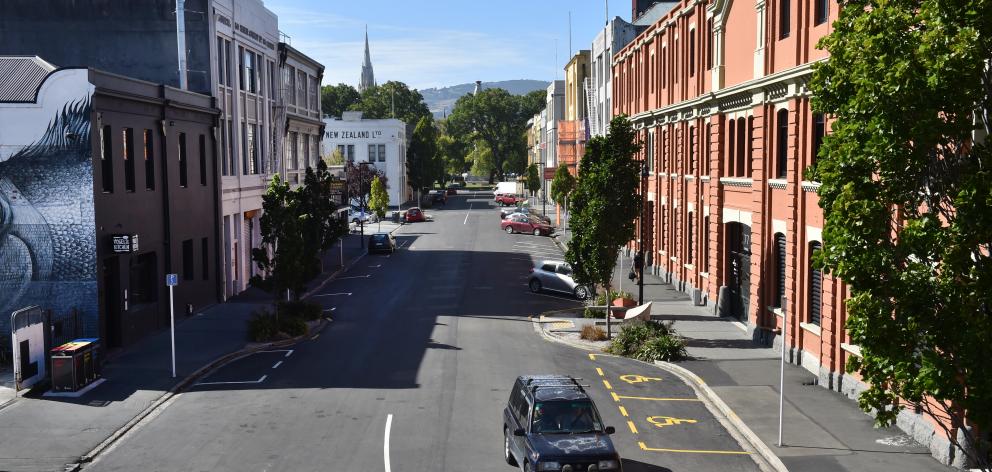
Under the Dunedin City Council’s reviewed second generation district plan (2GP), residential developers across the CBD and other parts of the city are under no obligation to provide parking for tenants or apartment owners, as long as the building offers five residential units or fewer.
The more lenient parking and other building requirements were part of the rezoning of the city’s inner city and warehouse precinct area, aimed at converting warehouse and other space into mixed-use residential and commercial developments, council planning and environment committee chairman David Benson-Pope said.
Under the 2GP, developers converting or upgrading older buildings in the city centre, harbourside, the southern part of Princes St, and Smith St and York Pl zones also had the right to remove existing parking spaces in favour of ensuring a positive streetscape.
In many cases they were also provided with grants from the city’s heritage fund for things like earthquake strengthening and retaining original street facades.
Last year the fund spent about half a million dollars across 29 city heritage projects.
Under the plan’s standard residential rules, only two parks were required for buildings with between six and eight rooms, and one additional parking space for every four rooms thereafter.
Student hostels came in at one bay for every 10 residents, although that requirement fell away if the hostel was located within 500m of the University of Otago campus zone.
Rest-homes merited one space for every three beds.
Council city development manager Anna Johnson said while the city was not able to forecast car parking demand by inner city dwellers, the requirements under the plan only set a minimum level of car parking.
"[These] ... were changed based on feedback from developments that they would like more flexibility to decide what levels of car parking may be required for their developments," Dr Johnson said.
City transport strategy manager Nick Sargent said the residents’ only parking scheme in the inner city residential zone was being reviewed to support the 2GP.
He said there were currently about 10,000 publicly available car parks in the central city. "This includes restricted on-street parking, car parking buildings, in open air car parks, and parks that are not marked and are unrestricted."
The city also leased out 659 parking spaces in the city; the 10 bays at the Wall St car park were the dearest at $271.27 per month and the cheapest were the 128 bays at the Thomas Burns car park, which were leased at $101.83 each month.
Harcourts Otago chief executive Kelvin Collins said while there would be "good demand" for inner city apartments on the back of more people in the city, people would still prefer some green space and parking was important to them.
Dr Johnson said current planning had focused on bringing residents into the central city, while ensuring the maintenance, restoration and reuse of heritage buildings.
However, in its just-released DCC-commissioned report ‘‘The Housing We’d Choose’’, research agency Research First said that given any choice of area, only around 6% of Dunedin residents would opt to live in the inner city as their first choice.
The city’s inner suburbs proved the most popular among all 770 respondents at 34.9% and the outer suburbs at 32.2%.
Taking into account the reality of house prices and incomes, the outer suburbs dropped to 27.9% while inner city living became more popular, at 9.5% of respondents.
"This implies that living in a more traditional suburban setting is important to a large portion of Dunedin residents," the research report concluded.
Comments
Like most people I'm more than happy to shop on-line instead of wasting my time and money on parking in CBD. Way to go DCC! Great job stimulating economic growth in the city!
Glad to see that you embrace change. I bet you never did much shopping online 20 years ago. Yes CBDs are changing and that is a good thing!
In tandem with this DCC where is the plan for light rail, servicing the shops in the city, unless you have that you are totally wrong. It needs to stop
We are very aware the DCC has taken this attitude. But it does not remove the love of our cars and we will continue to use them.
So long as you want one and you are willing to pay for the privilege, then go for it. Everything has a cost and so far many of the costs of cars have been hidden / shared. Once the costs become tangible, then people's choices may change.
Of course you will chose to pay whatever the cost is as you love your car that much.
Ok that's a real clever way to encourage inner city development DCC. Just relax the rules that could make anything difficult. And yea, why not also choose to forget that it's those very rules that enable everything to work in a sustainable and sensible way for everybody.
Keep continuing to stuff up traffic flows with your creative roading intersections with your hey, if it's not broken. Let's try and fix it ! approach. Keep reducing parking while simultaneously encouraging more people to live in the city. So you want your own mini Auckland buzz with its traffic congestion?
And of course you dont need reminding that its's not the developers that have to live with the no car parks... it will be everyone else and ultimately inner city retailers.
I want to press a button on my phone and an autonomous car pulls up within a couple of minutes.
I dont want to spend a large chunk of my hard earned money on a depreciating car, then worry about someone hitting me or scratching it or denting it.
I want a 4WD in winter to go skiing and a Mercedes for a night out. I want roads for these autonomous cars and not parking lanes. Because I didnt have to pay for as much roading (or a garage or car park), I can go on an extra luxury holiday each year.
There are cars and there are cars. One is the future and one will become a dinosaur. The car is dead, long live the car.
I can't help wondering if the research has returned what DCC planners want or what residents want.
True, in some large cities people happily live in apartments and all their work and entertainment is within short distances. But for most Dunedin inner city residents I really don't believe that would be true.
Some residents will use taxis / hire cars, pool cars and other means, but for many personal vehicle ownership will remain a necessity to move about. This plan seeks to lock in 25% parking spaces to apartments. The balance of apartment dwellers will simply use on street parking.
Ms Johnson says council can't predict what inner city dwellers might want. Why not just ask the ones who are here today? DCC are more than willing to spend a few hundred thousand on the Octigan experiment. How about spending $20,000 or so doing a survey of current residents? Or is this another example where we don't want to ask people because the result won't return what we want to hear?
Planning decisions including parking should never be left to developers. They will always take the most profitable route and that means no off street parking. Great for DCC, bad for residents.
Deluded City Planners. The bell tolls for Dunedin, internet shopping it is.
Even if we all have self-driving electric cars 15 years from now, we'll still need space to park them. I'm not surprised at the DCCs attitude though, given that our Mayor is afraid of driving. He either hitch hikes or takes the bus, so has no skin in the driving game. "You can explain all you like, but there are some things that a virgin can't comprehend" -Unknown
Why? if it's a self-driving car. then it will be owned by Uber, Mercedes, Alphabet etc. Why would you want to buy one? Press a button and it's there. No garage, no car park, no parking in the city centre, less roads needed.
And you can use the money to go shopping or on holiday rather than having a big lump of metal sitting on your driveway for 99% of its life. What a waste to own a car then.
Residential parking ≠ public parking.
The DCC has repeatedly stated it is not anti-car.
Now we read this.
My friends and family here in Dunedin are really starting to resent this council telling us what to do and the two-faced attitude with which they're doing it.
Truth is, many suburbs in Dunedin can ONLY practicably access the city by car (think: Abbotsford, Outram, hills areas) so all this anti-car planning is doing is making our lives more stressful, more expensive (as parking costs rise) and our commutes to work longer.
In the meantime, we see the DCC stupidly spending money on sandpits (think: outdoor cat toilets!) and ping pong tables.
This is feeling more and more like we voted a gang of inexperienced, shortsighted students to run our city.
This mistake will not happen again.
This isn't anti car. Mine is doing just fine. Anti private vehicle storage on public land, maybe. Nothing wrong with that. It's not a human right to clutter city streets with unsuitable, unwieldy, unsightly transport appliances.
Wake up Dunedin before it is too late - there is only so much coin to go around - the rainbow doesn't have a pot of gold, the normal council services have been ignored over the last 10 - 20 years to a state where they need urgent attention. Dunedin has or is starting to get Ghetto areas. Guess what it is not going to get any better, the inner city appartments and living areas that this council has on the radar will suck up all the funds, Councillors and Councillors old mates will get richer and the outer suburbs of Dunedin will become Ghettos.and your house prices will suffer.

